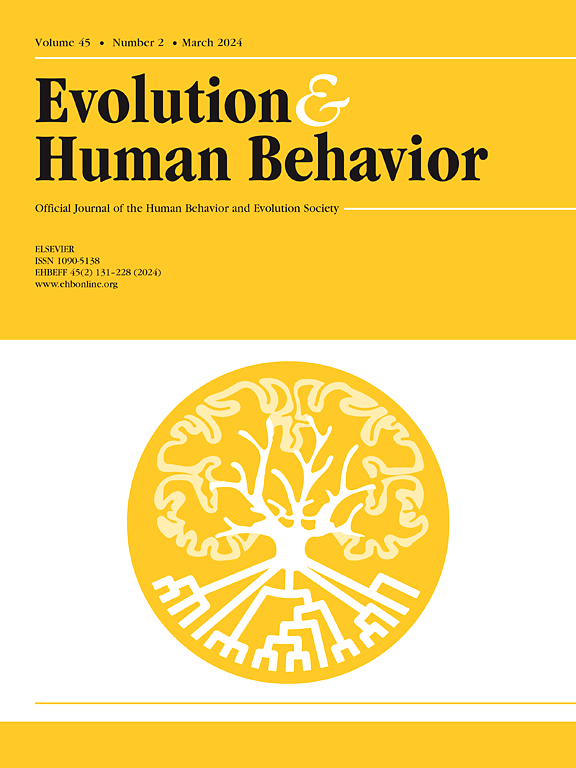人们决定是否分享社会信息——以及是否准确地分享——是基于自身利益
IF 3.2
1区 心理学
Q1 BEHAVIORAL SCIENCES
引用次数: 0
摘要
为什么人们要花那么多时间八卦?在这里,我们测试了关于人们如何利用声誉信息来实现社会目标的两种截然不同的假设。间接互惠理论提出了一个假设,即人们准确地分享关于自己和他人的信息,以奖励合作者和惩罚叛逃者。相反,基于声誉的合作伙伴选择理论认为,人们为了获得高质量的合作伙伴,会分享、隐瞒和扭曲有关自己和他人的信息。我们发现,如果受试者自己是慷慨的,而不是贪婪的,那么他们更有可能分享他人(和自己)以前慷慨的信息。之前慷慨大方的人最有可能八卦,而之前贪婪的人最不可能——在分享和隐瞒八卦分别符合他们的物质利益的条件下。同样地,以前慷慨的人更可能分享诚实的八卦,而以前贪婪的人更可能分享不诚实的八卦——当这符合他们的物质利益时。最后,以前慷慨的人比以前贪婪的人更不可能分享产生竞争优势的不诚实的八卦。虽然这些结果更符合基于声誉的合作伙伴选择理论,而不是通常所理解的间接互惠理论,但近30%的受试者即使在不付费的情况下也会分享信息。这一发现表明,人们分享声誉信息的决定并不完全是出于短期的物质考虑,尽管我们没有探讨避免被发现撒谎的社会成本的自利愿望。本文章由计算机程序翻译,如有差异,请以英文原文为准。
People decide whether to share social information–and whether to share it accurately–on the basis of self-interest
Why do people spend so much time gossiping? Here, we tested two distinct hypotheses about how people might use reputational information to achieve social goals. Indirect Reciprocity theory entails the hypothesis that people share information about themselves and others accurately in order to reward cooperators and punish defectors. In contrast, Reputation-Based Partner Choice theory proposes that people share, withhold, and distort information about themselves and others in order to secure high-quality cooperation partners. We found that subjects were more likely to share information about others' (and their own) previous generosity if they themselves had been generous rather than greedy. Previously generous people were most likely to gossip—and previously greedy people were least likely —under conditions in which sharing and withholding gossip, respectively, were in their material interest. Likewise, previously generous people were most likely to share honest gossip—and previously greedy people were most likely to share dishonest gossip—when it was in their material interest. Finally, previously generous people were less likely than previously greedy people to share dishonest gossip that yielded a competitive advantage. Although these results fit more comfortably with Reputation-based Partner Choice theory than with Indirect Reciprocity theory as commonly understood, nearly 30 % of subjects shared information even when it did not pay to do so. This finding suggests that people's decisions about sharing reputational information are not driven exclusively by short-term material considerations, although we did not explore the self-interested desire to avoid the social cost of being caught lying.
求助全文
通过发布文献求助,成功后即可免费获取论文全文。
去求助
来源期刊

Evolution and Human Behavior
生物-行为科学
CiteScore
8.30
自引率
9.80%
发文量
62
审稿时长
82 days
期刊介绍:
Evolution and Human Behavior is an interdisciplinary journal, presenting research reports and theory in which evolutionary perspectives are brought to bear on the study of human behavior. It is primarily a scientific journal, but submissions from scholars in the humanities are also encouraged. Papers reporting on theoretical and empirical work on other species will be welcome if their relevance to the human animal is apparent.
 求助内容:
求助内容: 应助结果提醒方式:
应助结果提醒方式:


